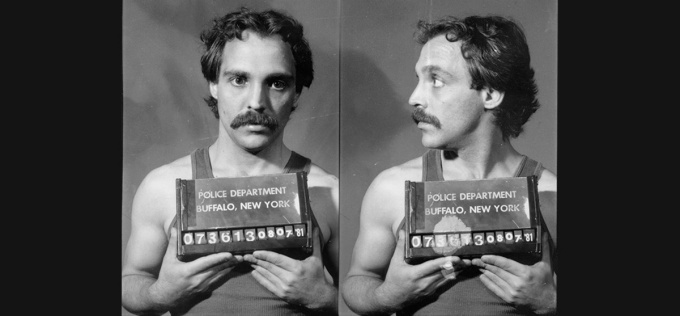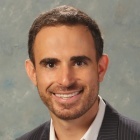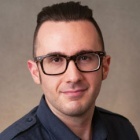
Bob Uplinger’s mugshots, taken on August 7th of 1981. Image courtesy of the Dr. Madeline Davis LGBTQ Archive of Western New York, Archives & Special Collections Department, E. H. Butler Library, SUNY Buffalo State.
Panel to discuss critical gay rights case
A little-known but highly significant case in the struggle for gay rights will be the topic of a University at Buffalo School of Law forum on Friday, Oct. 22, 2021.
The panel discussion, “Sex, Solicitation, and the Supreme Court: Remembering People v. Uplinger,” will take place via Zoom webinar from 12 noon to 1:30 p.m. Registration, which is free and open to the public, is available online.
Sponsored by UB School of Law and the Richard C. Failla LGBTQ Commission of the New York State Courts, the panel – an LGBTQ History month program - will address the ordeal of Robert Uplinger, a gay man who was arrested in Buffalo’s Allentown neighborhood in 1981 after propositioning another man on the steps of the Lenox Hotel. The other person turned out to be an undercover police officer, and Uplinger was charged with violating a state law prohibiting loitering “for the purpose to engage in deviate sexual intercourse.”
Uplinger’s lawyer, William H. Gardner ’59, argued that because New York had recently ruled consensual sodomy was legal, the law prohibiting solicitation was unconstitutional. Uplinger was found guilty in Buffalo City Court and his conviction was upheld in Erie County Court, but the state Court of Appeals reversed. The district attorney appealed to the U.S. Supreme Court, which heard oral arguments in the case in January 1984 but ultimately declined to rule on the merits. Uplinger’s victory thus remained intact. Two years later, however, in Bowers v. Hardwick, the Supreme Court upheld laws prohibiting same-sex intimacy, a holding not overruled until 2003 in Lawrence v. Texas.

Prof. Michael Boucai, University at Buffalo School of Law
“Uplinger tested the supposedly enlightened compromise that the Model Penal Code had struck with respect to sodomy laws,” says UB Law Professor Michael Boucai, who teaches and does research on gender and sexuality law and who will participate in the forum. “The model Code,” highly influential with state legislatures in the 1960s and 1970s, “eliminated criminal liability for sodomy per se but continued to prohibit solicitation of sodomy.” Normally, Boucai explains, “if it’s legal to do something, it’s equally legal to invite someone to do it.” Thus, Uplinger presented an opportunity to challenge the “anomalous statutory scheme” that New York had borrowed from the Model Penal Code.
In the forum, Boucai will discuss some of the legal aspects of the Uplinger case, situating it in the broader history of anti-sodomy laws and activists’ fight to overturn them.

Dr. Jeffry Iovannone, Cornell University (M.A. candidate, Historic Preservation Planning)
His co-presenter is a well-known historian of the LGBTQ movement in Western New York, Dr. Jeffry Iovannone, who Boucai says will provide local context for the case— “the culture of gay social life and cruising in that Buffalo neighborhood, the players involved and their connection to the Western New York LGBTQ community.”
According to Boucai, the idea for an event about Uplinger was first raised in March 2020 at UB School of Law’s annual OUTLaw dinner, in a chance conversation he had with Matthew Skinner, executive director of the Failla Commission. Skinner revived the idea upon learning of a plaque commemorating Uplinger’s arrest that was recently installed near the Lenox Hotel by the Buffalo-Niagara LGBTQ History Project. Skinner’s commission has sponsored a series of programs about important LGBTQ cases in New York State.
“In some ways I’m almost haunted by the whole saga that this poor man had to go through,” Skinner says. “Flirting with someone on a Saturday night and that leading to years of litigation culminating in the U.S. Supreme Court—it’s hard to wrap your head around.”
Skinner notes that a whole lot of LGBTQ legal history has unfolded in his short lifetime (he’s 38). “It’s not ancient history by any means,” he says. “I hope this history lesson can perhaps give people today some perspective, when they find themselves frustrated by the pace of progress, with a sense of how far we’ve come. It’s really eye-opening.”
Skinner and others from the commission will be in Buffalo for the Oct. 22 event to take part in the forum, meet with law students—and to visit the corner of North and Irving streets, where the historical marker now stands. Guests from the commission include co-chairs, Hon. Anthony Cannataro, Associate Judge, New York Court of Appeals and Hon. Joanne Winslow, Associate Justice, Appellate Division, Fourth Department; as well as Hon. E. Jeannette Ogden ’83, Supreme Court Justice, Eighth Judicial District; Andrea Conjerti, Esq.; and Grace Hanlon, confidential law clerk to Chautauqua County Court Judge David Foley.